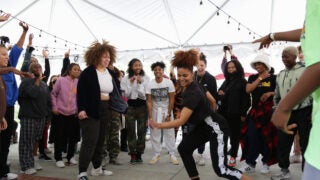Feel Like You Don’t Belong? You Might Have Impostor Syndrome
What do you do when your biggest doubter is yourself?
Jacqueline Liu ’03, MS ’11 holds three degrees, is vice president at marketing agency The Pollack Group and teaches classes at the USC Annenberg School for Communication and Journalism. But she still struggles with “impostor syndrome” — self-doubt and feelings that her achievements and skills aren’t good enough.
People with this persistent anxiety often feel inadequate and undeserving of their accomplishments. Impostor syndrome is a common issue for today’s university students, especially those in the first generation of their family to go to college. For Liu, the fears surfaced during her first job after graduation: a highly competitive workplace that made her question her credentials. Although she has made great strides in the ensuing years, she confesses that scrolling LinkedIn can still make her feel overwhelmed by her peers’ successes.
To help college students grappling with similar feelings, Liu opened up about her experience at a recent USC Annenberg event, “Coffee Connects: Coping with Impostor Syndrome.” Many students and faculty colleagues reached out afterward to share their own stories. She spoke with USC writer Margaret Crable about why this type of anxiety is so prevalent today.
How do you define impostor syndrome?
Constant feelings of inadequacy and self-doubt, along with downplaying successes and accomplishments. It’s obviously normal to experience these feelings occasionally, but impostor syndrome goes far beyond that. In the extreme, individuals may be paralyzed with debilitating fears and paranoia of being outed as a fraud.
What are some signs that someone might be suffering from impostor syndrome?
Pay attention to how someone talks about themselves. They may be abnormally fatalistic and cynical about their successes, both current and future. When you suggest they’d be the perfect candidate for a job, for example, they’ll lament that they don’t fit every single requirement of the job description.
Why might college students experience this feeling?
For USC students, many of whom graduated at the top of their class, it can be jarring to meet so many new people who seem smarter and more accomplished. You start questioning your own success. Now, couple these insecurities with what we see on social media. All of this is exponentially worse for students who haven’t followed the traditional prescribed timeline: starting college after high school and graduating in four years. When you feel out of step with your peers, you feel left out, unworthy and unsuccessful.
How can college students combat impostor syndrome? How can faculty members or parents offer support?
Journal and try to notice your thinking patterns. When those feelings of self-doubt creep in, pause. Then, pay yourself a compliment — literally say it out loud if you want — and remind yourself of everything you’re good at. Therapy has also helped me tremendously.
It’s very important that faculty members and parents acknowledge that impostor syndrome is real and share their own examples if they can. We can’t just give them trite, empty platitudes like “chin up” or “you’ll get over it.” We also need to remind people that social media is a highlight reel and in no way representative of people’s real lives.



